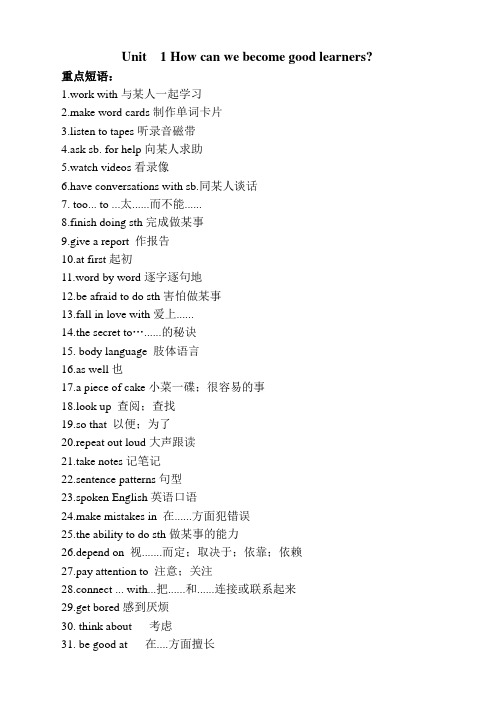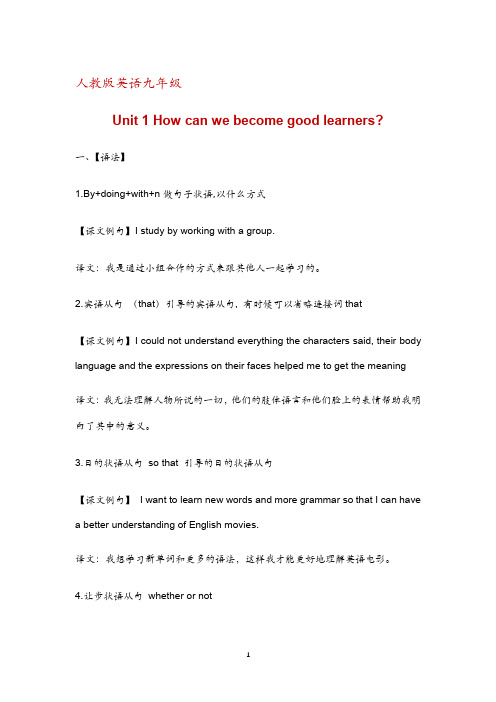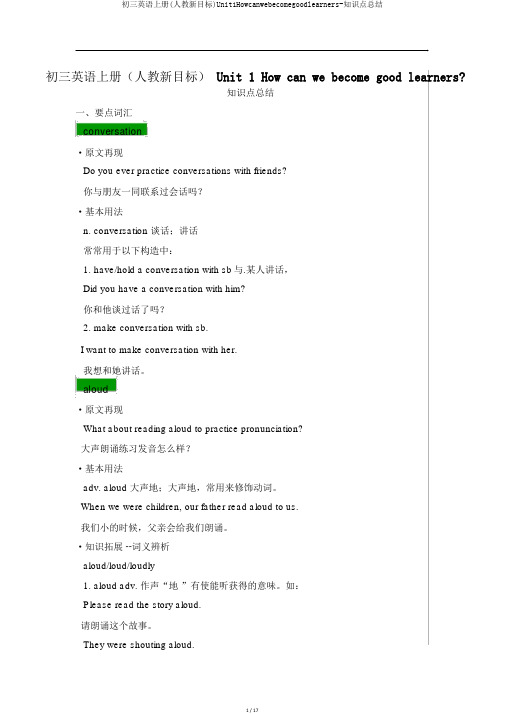unit1How can we become good learners
Unit--1-How-can-we-become-good-learners重点短语句型解析

Unit 1 How can we become good learners? 重点短语:1.work with与某人一起学习2.make word cards制作单词卡片3.listen to tapes听录音磁带4.ask sb. for help向某人求助5.watch videos看录像6.have conversations with sb.同某人谈话7. too... to ...太......而不能......8.finish doing sth完成做某事9.give a report 作报告10.at first起初11.word by word逐字逐句地12.be afraid to do sth害怕做某事13.fall in love with爱上......14.the secret to…......的秘诀15. body language 肢体语言16.as well也17.a piece of cake小菜一碟;很容易的事18.look up 查阅;查找19.so that 以便;为了20.repeat out loud大声跟读21.take notes记笔记22.sentence patterns句型23.spoken English英语口语24.make mistakes in 在......方面犯错误25.the ability to do sth做某事的能力26.depend on 视.......而定;取决于;依靠;依赖27.pay attention to 注意;关注28.connect ... with...把......和......连接或联系起来29.get bored感到厌烦30. think about 考虑31. be good at 在....方面擅长32. worry about 担心,担忧33.be afraid of 害怕......34.try to do sth 尽力做某事35.be stressed out焦虑不安的36.each time 每当;每次37.instead of代替,而不是38.even if即使,尽管39.be born with 生而具有固定短语:1.be afraid to do sth / be afraid of doing sth 害怕做某事2. by doing sth 通过做某事3. finish doing sth 完成某事4. try to do sth.. 尽力做某事5. find it + adj. + to do sth 发现做某事......6. begin to do sth 开始做某事7. help sb. ( to ) do sth 帮助某人做某事8. need to do sth 需要做某事9. keep doing sth 一直在做某事10. practice doing sth 练习做某事11. remember to do sth 记得去做某事知识点讲解:一.--------How do you learn English? —I learn by studying with a group.2.拓展:介词by的其他用法:1)by+交通工具,“乘/坐...” by bus2)by+地点,“在...的旁边;靠近...” by the lake3)by+时间,“截止到...;不迟于...” by ten【by短语】by the way 顺便问一下by accident= by chance 偶然地by mistake 错误地one by one 一个接一个step by step 一步一步地by the time 到……为止by oneself 独自地by hand 用手by the end of 到….... 末尾Eg. We’ll be traveling by car.He broke the window with a stone.Please answer the question in English.二..疑问词how的用法1)(问方式方法)怎样;如何①---_______ do you learn English well?---I learn it by using it in my daily life.②---Can you tell me_______I can get to the nearest post office?2) 身体怎么样?--How are you? ---Fine. Thanks.3) How +adj 构成的疑问词How often__________How old__________How far__________How soon__________How many__________How much__________How long__________How tall__________练习: 用How +adj 构成的疑问词填空1.--- __________will it take you from your school to the library?---About half an hour.2.---__________is Mr Wang? ---He is forty years old.3.--- __________ will you come back? ---In a week.4.--- __________people are there in your family? ---Four.5.--- __________milk do we need? ---Three bottles.6.--- __________do you go to see your grandma? ---Once a week.7.--- __________do you live from school? ---Three miles.三、.practice v 练习practice doing sth 练习做某事【拓展】finish doing sth ,enjoy doing sth , mind doing sth ,give in doing sth , can’t help doing sth①We often practice __________English among English.(speak)②This term I enjoy __________(watch) English movies.四.It’s too hard to understand spoken English.练习:①[2013·雅安] It is important ________ people ________ learn team spirit. A.of; of B.of; to C.for; to D.to; to②It’s foolish________him to do so. A. for B. of C. to D. with2.too...to...“太...而不能...”. Eg. He is too young to join the party.注意:not+反义词+enough to...so...that+否定句练习:我弟弟年龄太小不能上学。
Unit-1How-can-we-become-good-learners知识点归纳

Unit 1 How can we become good learners?单元短语1.work with sb与某人一起学习2.make word cards制作单词卡片3.listen to tapes听录音磁带4。
ask sb for help向某人求助5.watch videos看录像6。
have conversations with sb同某人谈话7.too.。
.to.。
太..。
而不能。
. 8.give a report作报告9.at first起初10。
word by word逐词逐句地11。
the secret to。
.。
. ..。
的秘诀12.be afraid to do sth害怕做某事 1 3.fall in love with爱上。
14.body language肢体语言15.as well也16.a piece of cake小菜一碟;很容易的事17。
look up查阅;查找。
18.so that以便;为了19。
repeat out loud大声跟读20。
take notes记笔记21。
sentence patterns句型22.spoken English英语口语23.make mistakes in在。
.。
方面犯错24.the ability to do sth做某事的能力25。
depend on视..。
而定;取决于;依靠26.pay attention to注意;关注27。
connect...with.。
把。
..和...连接或联系起来28.get bored感到厌烦29.try to do sth尽力做某事30.be stressed out焦虑不安的31。
be afraid of害怕..。
32.each time每当;每次语法知识:提问方式How do you。
? 或How can I...?答语: by+doing形式,“通过做..。
”的方式Eg: How do you study for a test?How can I turn on the light?I study by working with a group。
Unit 1 How can we become good learners知识点整理

Unit 1 How can we become good learners?语法一.介词by的用法1.by意为“通过”,其后常接名词或动词-ing形式。
用来表示“以、通过、用(某种方法或手段)”而达到某种预期的目的,常用来回答how引导的特殊疑问句。
by doing sth意为“通过做某事”—How does the boy improve his spoken English?—By talking with a foreigner.(1)—How do you learn English so well?—chatting with my uncle in America online.A. ByB. WithC. InD.And(2)Jackson studied Chinese by __________ tapes.A. listeningB. to listenC. listening toD. to listening to2.by+时间,意为“不迟于,在……之前”I have to go to bed by ten o’clock.3.by+地点,意为“在……旁”Jim sat down by the window.4.by+交通工具,意为“乘……”I go to school by bike.5.由by构成的固定短语:by the way顺便说一下by oneself独自=alone二.现在完成时的用法(一)用法:1.表示过去发生的某一动作或状态对现在造成的影响或结果.常用的标志词有already(“已经”,用于肯定句),yet(“还,已经”,用于否定句和疑问句),ever (“曾经”),never(“绝不,从不”),just(“刚刚”),before(“以前”),once (“一次”),twice(“两次”).I have already eaten the dinner.(说明我现在饱了)。
Unit 1 How can we become good learners?(讲义&答案).

Unit 1 How can we become good learners?Words and Expressionstextbook /'tekstbʊk/ n. 教科书;课本conversation /,kɒnvə'seɪʃn/ n. 交谈;谈话aloud /ə'laʊd/ adv. 大声地;出声地pronunciation /prə,nʌnsi'eɪʃn/ n.发音;读音sentence /'sentəns/ n.句子patient /'peɪʃnt/ adj.有耐心的n.病人expression /ɪk'spreʃn/ n. 表达(方式);表示discover /dɪ'skʌvə(r)/ v. 发现;发觉secret /'si:krət/ n. 秘密;秘诀adj. 秘密的;保密的look up (在词典、参考书中或通过电脑) 查阅;抬头看grammar /'græmə(r)/ n.语法repeat /rɪ'pi:t/ v.重复;重做note /nəʊt/ n. 笔记;记录v. 注意;指出pal /pæl/ n.朋友;伙伴physics /'fɪzɪks/ n.物理;物理学chemistry /'kemɪstri/ n.化学memorize /'meməraɪz/ v.记忆;记住pattern /'pætn/, /'pætərn/ n.模式;方式pronounce /prə'naʊns/ v.发音increase /ɪn'kri:s/ v.增加;增长speed /spi:d/ n.速度partner /'pɑ:(r)tnə(r)/ n.搭档;同伴born /bɔ:(r)n/ v. 出生adj. 天生的be born with 天生具有ability /ə'bɪləti/ n.能力;才能create /kriˈeɪt/ v.创造;创建brain /breɪn/ n. 大脑active /'æktɪv/ adj.活跃的;积极的attention /ə'tenʃn/ n.注意;关注pay attention to 注意;关注connect /kə'nekt/ v.(使)连接;与……有联系connect…with 把……和……连接或联系起来overnight /,əʊvə(r)'naɪt/ adv.一夜之间;在夜间review /rɪ'vjʊ:/ v. & n.回顾;复习knowledge /'nɒlɪdʒ/ n.知识;学问lifelong /ˈlaɪflɒŋ/ adj. 终身的;毕生的wisely /'waɪzli/ adv.明智地;聪明地Annie /æni/ 安妮(女名)Alexander /,ælɪg'zændər/ Graham /'greɪəm/ Bell /bel/ 亚历山大·格雷厄姆·贝尔Role-play the conversation.Jack: Annie, I’m a little nervous. I have to finish readinga book and give a report next Monday.Annie: That doesn’t sound too bad.Jack: Bu t I’m a very slow reader.Annie: Just read quickly to get the main ideas at first.Don’t read word by word, read word groups.Jack: But I don’t understand many of the words. I have to u se a dictionary.Annie: Try to guess a word’s meaning by reading the sentences before and after it. You probably understand more than you think.Jack: That sounds difficult!Annie: Well, be patient. It takes time. You can become better by reading something you enjoy every day. The more you read, the faster you’ll be.Reading 1Read the passage about Wei Fen and answer the questions.1. Why did Wei Fen find it difficult to learn English?2. What did she do in English class?3. What is the secret to language learning?How I Learned to Learn EnglishLast year, I did not like my English class. Every class was like abad dream. The teacher spoke so quickly that I did not understand hermost of the time. I was afraid to ask questions because of my poorpronunciation. I just hid behind my textbook and never said anything.Then one day I watched an English movie called Toy Story. I fell in love with this exciting and funny movie! So I began to watch other English movies, too. Although I could not understand everything the characters said, their body language and the expressions on their faces helped me to get the meaning. I also realized I could get the meaning by listening for just the key words. My pronunciation improved as well by listening to the conversations in English movies. I discovered that listening to something interesting is the secret to language learning. I also learned useful sentences like “It’s a piece of cake” or “It serves you right.” I did not understand these sentences at first. But because I wanted to understand the story, I looked them up in a dictionary.Now I really enjoy my English class. I want to learn new words and more grammar so that I can have a better understanding of English movies.3b Complete the sentences with what Wei Fen learned from watching movies. Use words and phrases from the passage.1.I can understand the meaning by watching their ____________ and the ___________ ontheir faces.2.I can get the meaning by listening for just the____________.3.My pronunciation improved by listening to the ____________ in English movies.4.I learned _____________ sentences like “It’s a piece of cake” by watching the movies.5.I can find the meaning of the new words by looking them up in a _____________.Grammar FocusHow do you learn English? I learn by studying with a group.Do you learn English by reading alo u d? Yes, I do. It helps my pronunciation.How can I read faster? You can read faster by reading word groups.How can I improve my pronunciation? One way is by listening to tapes.语法小结:一、Look短语look after __________________look at __________________look down upon __________________look forward to __________________look for __________________look like __________________look out of…__________________look out __________________look through __________________look up __________________look up to __________________二、介词by的用法by是介词,后接名词、代词或动名词作宾语,意义较多,归纳如下:(1)by表示方式、方法、手段等,意为“通过/用/靠/乘……(而达到某种预期的目的)”,by +doing sth. 意为“通过做某事”在句中作方式状语。
(完整版)人教版九年级英语课文原文unit1Howcanwebecomegoodlearners

Unit 1 How can we become good learners?Last year, I didn’t like my English class. Every class was like a bad dream. The teacher spoke so quickly that I didn’t understand her most of the time. I was afraid to ask questions because of my poor pronunciation. I just hid behind my textbook and never said anything.Then one day I watched an English movie called toy story. I fell in love with this exciting and funny movie! So I began to watch other English movies, too. Although I could not understand everything the characters said, their body language and the expressions on their faces helped me to get the meaning. I also realized I could get the meaning by listening for just the key words. My pronunciation improved as well by listening to the conversations in English movies. I discovered that listening something interesting is the secret to language learning. I also learned useful sentences like “It’s a piece cake”or “It serves you right”. I did not understand these sentences at first. But because I wanted to understand the story, I looked them up in the dictionary.Now I really enjoy my English class. I want to learn new words and more grammar so that I can have a better understanding of English movies.How Can You Become a Successful L earner?Everyone is born with the ability to learn. But weather or not you can do this well depends on your learning habits. Research shows that successful learners have some good habits in common.Creating an interest in what they learnStudies show that if you are interested in something, your brain is more active and it is also easier for you to pay attention to it for a long time. Good learners often connect what they need to learn with something interesting. For example,if they need to learn English and they like music or sports, they can listen to English songs or watch sports programs in English. This way they will not get bored.Practising and learning from mistakesGood learners think about what they are goog at and what they need to practise more. Remember, “Use it or loser it.”Even if you learn something well,you will forget it unless you use it. “Practice makes perfect.”Good learners will keep practising what they have learned, they are not afraid of making mistakes. Alexander Graham Bell did not invent the telephone overnight. He succeeded by trying many times and learning from his mistakes.Developing their studying skillsIt is not enough to just study hard. Good learners know the best way they can study. For example, they may take notes by writing down key words or by drawing mind maps. They also look for ways to review what they have learned. They may do this by reading their notes every day or by explaining the information to another student. Asking questionsGood learners often ask questions during or after class, They even ask each other and try to find out the answers. Knowledge comes from questioning.Learning is a lifelong journey because every brings something new. Everything they you learn becomes a part of you and changes you, so learn wisely and learn well.。
unit1howcanwebecomegoodlearners知识点整理

Unit 1 How can we become good lear ners语法一. 介词by 的用法意为“通过”,其后常接名词或动词-ing 形式。
用来表示“以、通过、用(某 种方法或手段)”而达到某种预期的目的,常用来回答how 引导的特殊疑问 句。
by doing sth 意为“通过做某事”—How does the boy improve his sp oke n En glish—By talk ing with a foreig ner.(1) — How do you lear n En glish so well— chatt ing with my un cle in America on li ne.A. ByB. WithC. In(2) ___________________________________________ Jacks on studied Chin ese by tap es.A. liste ningB. to liste nC. liste ning toD. to liste ning to+时间,意为“不迟于,在 ... 之前” I have to go to bed by ten o ' clock. +地点,意为“在 ...旁” Jim sat dow n by the win dow.+交通工具,意为“乘 .. ” I go to school by bike.5.由by 构成的固定短语:by the way 顺便说一下 by on eself 独自=al one二. 现在完成时的用法(一)用法:1.表示过去发生的某一动作或状态对现在造成的影响或结果 .常用的标志词有 already ( “已经”,用于肯定句),yet ( “还,已经”,用于否定句和疑问句),ever(“曾经”),never (“绝不,从不”)just (“冈j 冈『'),before (“以前”),once (“一次”),twice (“两次”).I have already eate n the dinner.I have already see n the film.(1) You don ' t need to describe her. IA. meetB. will meetC. have met (2) — Hi, are you heading( 向 ....... 行进)now— all our money,so we have to walk home now.(说明我现在饱了)。
英语九年级Unit 1 How can we become good learners重难点知识

人教版英语九年级Unit 1 How can we become good learners?一、【语法】1.By+doing+with+n做句子状语,以什么方式【课文例句】I study by working with a group.译文:我是通过小组合作的方式来跟其他人一起学习的。
2.宾语从句(that)引导的宾语从句, 有时候可以省略连接词that【课文例句】I could not understand everything the characters said, their body language and the expressions on their faces helped me to get the meaning译文:我无法理解人物所说的一切,他们的肢体语言和他们脸上的表情帮助我明白了其中的意义。
3.目的状语从句so that 引导的目的状语从句【课文例句】I want to learn new words and more grammar so that I can have a better understanding of English movies.译文:我想学习新单词和更多的语法,这样我才能更好地理解英语电影。
4.让步状语从句whether or not【课文例句】Whether or not you can do this well depends on your learning habits.译文:你能否做好这件事取决于你的学习习惯。
定义从句that 引导的定语从句修饰everything【课文例句】Everything that you learn becomes a part of you and changes you.译文:你所学到的一切都成为你的一部分,改变你。
二、【重点句型】1.What/How about going shopping? 去购物怎么样?2.Why don't you go shopping? 你为什么不去购物呢?3.Why not go shopping? 为什么不去购物呢?4.Let's go shopping. 我们去购物吧。
初三英语上册(人教新目标)Unit1Howcanwebecomegoodlearners-知识点总结

初三英语上册(人教新目标)Unit 1 How can we become good learners?知识点总结一、要点词汇conversation·原文再现Do you ever practice conversations with friends?你与朋友一同联系过会话吗?·基本用法n. conversation 谈话;讲话常常用于以下构造中:1. have/hold a conversation with sb与.某人讲话,Did you have a conversation with him?你和他谈过话了吗?2. make conversation with sb.I want to make conversation with her.我想和她讲话。
aloud·原文再现What about reading aloud to practice pronunciation?大声朗诵练习发音怎么样?·基本用法adv. aloud 大声地;大声地,常用来修饰动词。
When we were children, our father read aloud to us.我们小的时候,父亲会给我们朗诵。
·知识拓展 --词义辨析aloud/loud/loudly1.aloud adv. 作声“地”有使能听获得的意味。
如:Please read the story aloud.请朗诵这个故事。
They were shouting aloud.他们在大声地呼叫。
2.loud. adv. 大声“地,大声地,响亮地”,常指在谈笑等方面。
如:Don't talk so loud.不要这样大声地讲话。
Speak louder.说得大声点儿。
3.loudly adv. 大声“地”有时与 loud 通用,但含有喧杂的意味。
如:Someone knocked loudly at the door.有人大声叩门。
- 1、下载文档前请自行甄别文档内容的完整性,平台不提供额外的编辑、内容补充、找答案等附加服务。
- 2、"仅部分预览"的文档,不可在线预览部分如存在完整性等问题,可反馈申请退款(可完整预览的文档不适用该条件!)。
- 3、如文档侵犯您的权益,请联系客服反馈,我们会尽快为您处理(人工客服工作时间:9:00-18:30)。
语法重点2
ever意为“曾经”。经常用于
现在完成时(助动词has/have+过去分词)句子当中。 E.g.:---Have you ever been to Mount Emei? ---Yes, I have. / No, never. 【2012四川乐山】Tony is very nice. He is the friendliest B person I _______. A. meet ever C. had ever met B. have ever met
2、用作副词
1)意为“经过”,相当于past e.g. She drove by without stopping.她开车经过时没有停车。 2)意为“在附近” e.g. There was no one by at that time.那时没有人在附近
3、一些习惯搭配
by the way 顺便说一句 one by one 一个接一个地 day by day 日复一日 bit by bit 一点一点地 by oneself 独立的 learn by heart记住,记下来 little by little 逐渐地
5. _____ √ Have you ever studied with a group?
Complete the following questions
watching 1. Do you learn English by________(watch)videos. conversations 2. Do you ever practice ___________(conversation) with friends? listening 3. What about ___________(listen) to tapes? reading aloud 朗读) to practice 4. What about ______________( pronunciation _______________ (发音)? studied 5. Have you ever_________(study) with a group?
2b Listen and match the questions with their answers.
1. _____ √ Does anyone learn English by watching videos?
2. ____ √ Do you have conversations with friends in English? 3. _____ What about listening to ﻼ tapes? 4. _____ √ What about reading aloud to practice pronunciation?
A: How do you study for a test? B: I study by….
by studying with a group
A: How do you study for a test? B: I study by….
by asking the teacher for help.
a. Yes, I have. I’ve learned a lot that (in)that way way. 用那种方法 b. Oh, yes. It really improves my speaking skills. 口语技能 c. I do that sometimes. I think it helps. d. No. It’s too hard to understand spoken English. 英语口语
by making word cards
A: How do you study for a test? B: I study by….
by reading the textbook
A: How do you study for a test? B: I study by….
by listening to tapes
By的用法小结
1、用作介词
by, in, with 的区别 by 某种方式,方法 in “使用语言(语调、笔墨、颜色)” with “使用某种工具”,主语是人。
1)表示方式、方法、手段,意为“通过/用/靠… …(而达到某种预期的目的)”其后接名 词或动名词短语,在句中作方式状语,可放句首也可放句尾。 e.g.: I try to pass the exam by working hard. 2)表时间,意为“在… …之前;到……为止;不迟于… …” e.g. You must finish the work by 12 o’clock . 3) 表示位置,意为“靠近… …;在……旁边” e.g. She often walks by the river. 4)被动语态中,后接执行者,意为“由,被” e.g. Telephone was invented by Bell. 5)表示乘坐某种交通工具,在句中作状语。 e.g . They went to Shanghai by train. 6)表示度量、准则和标准 e.g. He does everything by rule. 7)表示被抓着,被接触身体的某一部分,意为“抓,拉” e.g. She took me by the hand.
How does he study English?
He studies English by
making word cards.
He studies English by reading the textbook.
How does he study English?
He studies English by listening to tapes. He studies English by asking the teacher for help.
1b Listen and Number !
Meiping
1. ______ A
Peter
2. ______ C 3. ______ B
Tony
1c Make conversations about how you study for a test? Write letters from 1a above.
How does she study English?
Her English is very good. Do you know how she studies English? She studies English by…
How do they study English?
They study English by …
the ways you study A: How do you study for a test? 1a Check English. B: I study by…. Then add other ways you sometimes study.
_____ a. by working with friends _____ b. by making word cards _____ c. by reading the textbook _____ d. by listening to tapes _____ e. by asking the teacher for help _____ by ____________________________________ studying with a group __________________________________________ by watching videos by having conversations with friends in English by reading aloud by learning grammar
Try to guess a word’s meaning by reading the sentences before and after it.
Read something he enjoys every day
2d
Reading
Jack: Annie, I’m a little nervous. I have to finish reading a book and give a report next Monday. Annie: That doesn’t sound too bad. Jack: But I’m a very slow reader. First of all首先 Annie: Just read quickly to get the main in the beginning起初,起先= ideas at first. Don’t read word by word. 逐字 day by day one by one Read word groups. 一个接一个的日复一日 Jack: But I don’t understand many of the words. I have to use a dictionary.
A: How do you study for a test? B: I study by working with a group.
Name
…… ……
How to study for a test ?
• Report: …. studies for a test by …
2a Listen and check the questions you hear.
1. _____ √ Does anyone learn English by watching videos? 2. _____ √ Do you have conversations with friends in English? have conversations with sb.与某人对话 3. _____ ﻼWhat about listening to tapes? 4. _____ √ What about reading aloud to practice pronunciation? read aloud/loudly 大声读 5. _____ √ Have you ever studied with a group?
